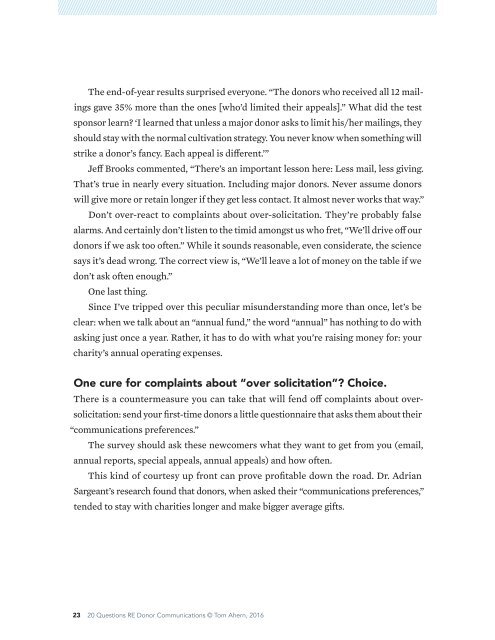20-Question-FINAL-2016-r2
20-Question-FINAL-2016-r2
20-Question-FINAL-2016-r2
You also want an ePaper? Increase the reach of your titles
YUMPU automatically turns print PDFs into web optimized ePapers that Google loves.
The end-of-year results surprised everyone. “The donors who received all 12 mailings<br />
gave 35% more than the ones [who’d limited their appeals].” What did the test<br />
sponsor learn? ‘I learned that unless a major donor asks to limit his/her mailings, they<br />
should stay with the normal cultivation strategy. You never know when something will<br />
strike a donor’s fancy. Each appeal is different.’”<br />
Jeff Brooks commented, “There’s an important lesson here: Less mail, less giving.<br />
That’s true in nearly every situation. Including major donors. Never assume donors<br />
will give more or retain longer if they get less contact. It almost never works that way.”<br />
Don’t over-react to complaints about over-solicitation. They’re probably false<br />
alarms. And certainly don’t listen to the timid amongst us who fret, “We’ll drive off our<br />
donors if we ask too often.” While it sounds reasonable, even considerate, the science<br />
says it’s dead wrong. The correct view is, “We’ll leave a lot of money on the table if we<br />
don’t ask often enough.”<br />
One last thing.<br />
Since I’ve tripped over this peculiar misunderstanding more than once, let’s be<br />
clear: when we talk about an “annual fund,” the word “annual” has nothing to do with<br />
asking just once a year. Rather, it has to do with what you’re raising money for: your<br />
charity’s annual operating expenses.<br />
One cure for complaints about “over solicitation”? Choice.<br />
There is a countermeasure you can take that will fend off complaints about oversolicitation:<br />
send your first-time donors a little questionnaire that asks them about their<br />
“communications preferences.”<br />
The survey should ask these newcomers what they want to get from you (email,<br />
annual reports, special appeals, annual appeals) and how often.<br />
This kind of courtesy up front can prove profitable down the road. Dr. Adrian<br />
Sargeant’s research found that donors, when asked their “communications preferences,”<br />
tended to stay with charities longer and make bigger average gifts.<br />
23<br />
<strong>20</strong> <strong>Question</strong>s RE Donor Communications © Tom Ahern, <strong>20</strong>16


